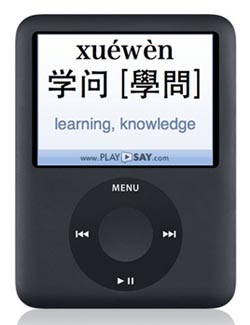 PlaySay founder Ryan Meinzer had always wanted to work in Japan.
PlaySay founder Ryan Meinzer had always wanted to work in Japan.
So, the 26-year-old Temple University business grad packed his bags and headed for the island with a degree in international business and entrepreneurship and minors in Japanese and Asian business.
After landing a marketing gig, his 14-hour work days left little time to grasp the language to the degree that he wanted; he couldn’t enroll in classes or sign-up for comprehensive language learning software.
“I was so so busy and I never had time to study. I needed to learn fast,” Meinzer says.
So, he decided to put together his own lesson plans. He eschewed text book and flash cards for their bulk and created virtual audio flashcards for his iPod using podcast-esque technologies. MP3 files are backed with digital ‘flash cards’—audio files with images of the word being spoken.
And without knowing it, he embarked on a business.
Today, PlaySay lets users purchase ‘word credits’ that can be invested in up to three different languages—Japanese, Chinese and Spanish—in a format that can be played on any portable music player. The company has more than 20,000 words in its library. In the last year, Meinzer has sold 3,000 packages in its portfolio of products.
“Our method is the fastest way to increase your vocabulary. There’s a ton of comprehensive learning language offerings. The thing is that people buy that stuff and never touch it again.” If you only have a few moments of free time, PlaySay lets you learn at your own pace, he says.
Sales of PlaySay have afforded him the opportunity to go full-time with his product. Meinzer, who is in the process of moving to Philadelphia to run the company after spending two years overseas, says he was financially backed by an executive of PayPal Japan in August of 2008. The investment went to a new Web site and to the scalability of the product.
“I can cut and chop a new language in a matter of a few days,” he says. “That took me a year to do originally.”
The company also has an iPhone application coming out within a week that lets users do everything they can do on PlaySay’s Web site. Users can even purchase lesson packages directly from the app.
Meinzer hopes to expand the library with more languages, and potentially add grammatical instruction in addition to its vocab-focused offering. The company will seek additional rounds of funding when he heads to Silicon Valley over the next few months, he says.
Back in Philadelphia, Meinzer hopes to focus on marketing. He says they are launching a campaign to advertise in student newspapers to appeal to college students, the product’s core demographic.
But why Philadelphia?
“[Philadelphia] is booming with tech startups and I love the entrepreneurship in the city. There’s no startup world over in Tokyo and I didn’t want to be in California because that’s not home for me.”
He won’t need any flash cards to speak the language here, either.
Technically Not Tech: PlaySay digital language learning flash cards







